So my three weeks in Gaziantep are over, and I’m back in Izmir.
As mentioned in a previous post, my wife went there for work, and I accompanied her in support of our 7 month old baby girl.
Ordinarily, I would have liked to run around and conduct some interviews, because Gaziantep is a very interesting place these days. First, it’s Turkey’s institutional gateway into Syria. The Turkish-controlled parts of Syria are linked up to Gaziantep’s government [Valilik], as are the “NGOs” providing services in Syria. All that institutional machinery is now shifting with the fall of the regime. That’s interesting.
Second, Gaziantep is something of a demographic bellwether for the rest of the country. This is officially a city of 3 million inhabitants, but there’s a very large Syrian population as well. I hear officials put that population at 400-500 thousand, but I’ve heard people say double that. Walking around the streets, I heard almost as much Arabic as I did Turkish.
And I did walk. A lot.
Because there’s two ways Refia falls asleep: while breastfeeding, or in her stroller. I lack the hardware for the former, so I focus on the latter. This meant that I walked 10-16 thousand steps a day. I remained within the central Şahinbey district, which has a big park running through it, and that’s where we spent most of our time.
So while I don’t have special policy insights into what’s going on in the city, I thought I might share little snippets from some of my days.
Fragment #1
It’s lunchtime and I’m at an eatery called Mutfakna. They make vegan/vegetarian dishes from Anatolia and the Levant, and I think they also train up local women into the business. I’d say half the dishes are either Syrian or Lebanese, and they’re delicious. I ate almost all my meals there.
Anyways, I’m sitting outside, digging into my rice and mezze, while Refia, my daughter, is sleeping in her stroller. I’ve got a bunch of little tricks and gadgets to make sure she’s comfortable: there’s a little sound machine making white noise, a little egg-shaped device that gently rocks the stroller while it’s stationary, and a summer shawl wrapped around the stroller so the sun isn’t bothering her.
I’ve got headphones in my ears, listening to an audio book as I eat.
I then notice two women walking down the street towards me. One is completely covered up in a black niqab, so only her eyes are visible, but I can tell from the way she’s walking that she must be old. The other is young, her face is visible, and she’s wearing white and slightly cream-colored clothing. She’s also carrying a baby right around Refia’s age in her arms.
I remember thinking that the black-white combination kind of looks like that old comic, Spy vs. Spy.
They walk past me, and I’m trying to remember who drew the Spy vs. Spy comics, when I hear a sound behind me. I turn around, and it’s the two women saying something to me. I take my headphones off, try to listen, but they’re speaking in Arabic. I tell them in Turkish that I don’t know Arabic.
“Ah, I thought you were Syrian” says the woman in white, in a heavily accented, but pretty good Turkish. The woman in black keeps saying things in Arabic.
The woman in white translates: “What is wrong with your baby?” she asks, pointing to the stroller.
I look. She pointing right at Refia’s feet, poking out of the shawl, and they’re vibrating.
I explain that it’s the egg-shaped device attached to the handle of the stroller is rocking it, helping her stay asleep.
The woman in white translates very quickly for the woman in black. They both make sounds of relief. Then she says to me “we were worried. It looked like there was an earthquake”
“God forbid” [Allah korusun] I say.
“God forbid” repeats the woman in white.
She asks me if she may look at the device. I say she may, and extoll the device’s virtues.
She asks me where I got it from. I say I got it from Amazon’s UK store, but speculate that in Turkey, Trendyol, Turkey’s biggest e-commerce marketplace, might carry the same product. I point out that the name of the device is written on the side. She takes a careful look at it and says some things to the woman in black.
She thanks me, and both women wish me a good day. I wave them off and continue my meal.
Fragment #2
I’m at a “hırdavatçı,” which are stores where you can buy small hardware and DYI stuff. I’m there to buy a plastic wash basin we need to bathe Refia.
I notice that the store is run by a group of teenage girls. They’re ringing up customers, moving around boxes, but whenever they have time, they also just sit around, talk in Arabic, and giggle furiously. Two of them are wearing headscarves, and they tie them in a Syrian style, rather than the Turkish styles.
I pick a basin and walk to the counter to pay for it. One of the girls is ringing me up, but she’s taking her time.
A boy, not 10 years old, walks into the store. He’s asking one of the younger girls a question.
“pıtpıt var mı?” [do you have pıtpıt?] I hear him ask.
The girl says she doesn’t understand.
“pıtpıt, pıtpıt!”
She still doesn’t get it. The boy is a bit upset. There’s people outside the store waiting for him. He’s now explaining what he means by “pıtpıt.”
“haaa” says the girl, “paspas, onun adı paspas,” [“ooh, a doormat, that’s called a doormat”].
It’s now apparent that the boy has a lisp, and can’t make the “s” sound.
“paspas yok bizde” [we don’t have doormats] says the Syrian girl, in perfect Istanbul Turkish.
The boy thanks her and rushes out to rejoin his group.
Fragment #3
I’m with a few young Syrians. Some of them are playing with Refia, so I’m free to drink tea and chat.
We’re talking about language and names in Turkish and Arabic. They speak excellent Turkish except one guy, who understands it fine, but doesn’t speak it, so we’re talking mostly in English, occasionally dipping into Turkish and Arabic.
One of them comments on my name, saying it reminds him of a phrase:
Selam selim, arak min en nesim (سلام سليم أراك من النسيم)
Everybody laughs. I’m told it roughly means something like “Hello Selim, I see you coming from the breeze.” I gather it’s a corny phrase mostly old people use.
Fragment #4
It’s past Refia’s bedtime, but her mother has a late meeting, so I’m taking her on an afternoon walk. Evening is drawing in, my legs feel like rubber, but I keep going. And it’s working. Refia is fast asleep.
I discover that one end of the park leads to a big square with a massive statue in the middle. There’s busy roads on two sides of it, which makes me think of the way Taksim Square used to be. There’s a statue at the center.
I walk up to the statue. It depicts the war of independence, with a kalpak-wearing Atatürk emerging from one corner, and soldiers and peasants carrying arms and munitions after him.
I walk around to find a phrase carved into stone.
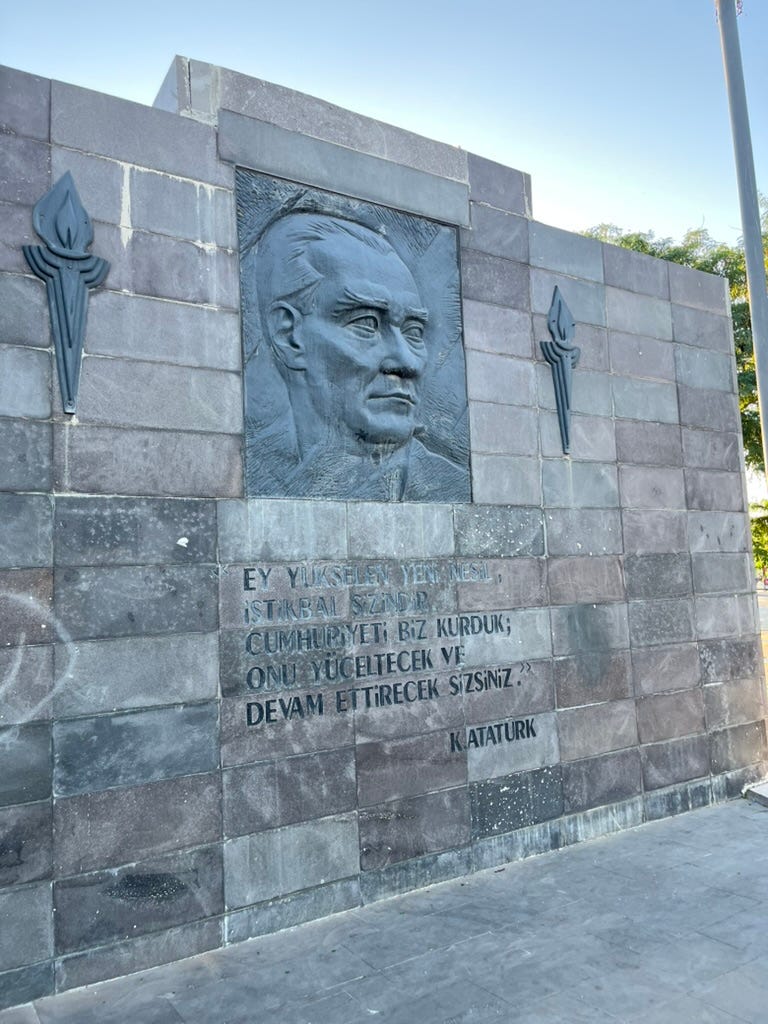
This puts me in a bad mood. The Republic has all but collapsed. At best, we have regressed to a single-party state.
I walk around to Atatürk in his kalpak, put on the breaks on my stroller, sit on the steps, and scroll on my phone, engaging in a Substack dialogue about a minor linguistic point.
A pudgy teenage boy comes around and stands in between me and Atatürk. He’s posing for a photo and I’m in the way.
I’m a bit annoyed, but undo the breaks on the stroller and start getting up, when I hear a voice coming from behind me, where the person taking the photo must be standing.
“Don’t do a hand sign” [İşaret yapma ama] he says, “don’t do it. Put your hand down. If you do a hand sign I won’t take the photo.” [Yapma, indir elini. İşaret yaparsan çekmem.]
“Just once!” says the boy.
I turn to look at the boy, already knowing what sign he’s making.
It’s the wolf salute of course.
The boy then walks back to his father to check the photo.
“It’s not a nice thing, I told you not to do it” [Güzel bişey değil ama, yapma dedim] I hear the father saying, as I walk away.
Fragment #5
I’m walking in the big park around midday. It’s pretty hot, I’m sticking to the shade. Refia is sleeping.
At this point I have a pretty good idea that I’m going to write something like this, so I’m looking for interesting photos to take.
There’s an insect-themed playground.
There’s a little outbuilding belonging to the Gaziantep Municipal Band. They’re usually practicing their brass instruments, so I usually stay away while Refia is sleeping. This time I see them taking a smoke break, so I approach for a photo.
There’s a mosque, which during my three weeks here, hasn’t seen a lot of traffic. It was built in 1990. There’s a canal that runs next to it, through the entire park complex, but there’s very little water right now and lots of garbage around it. Whenever I cross its bridges, I end up having to wave away swarms of flies. (I’ve got a fly net for Refia’s stroller, so she’s crossing in style.)
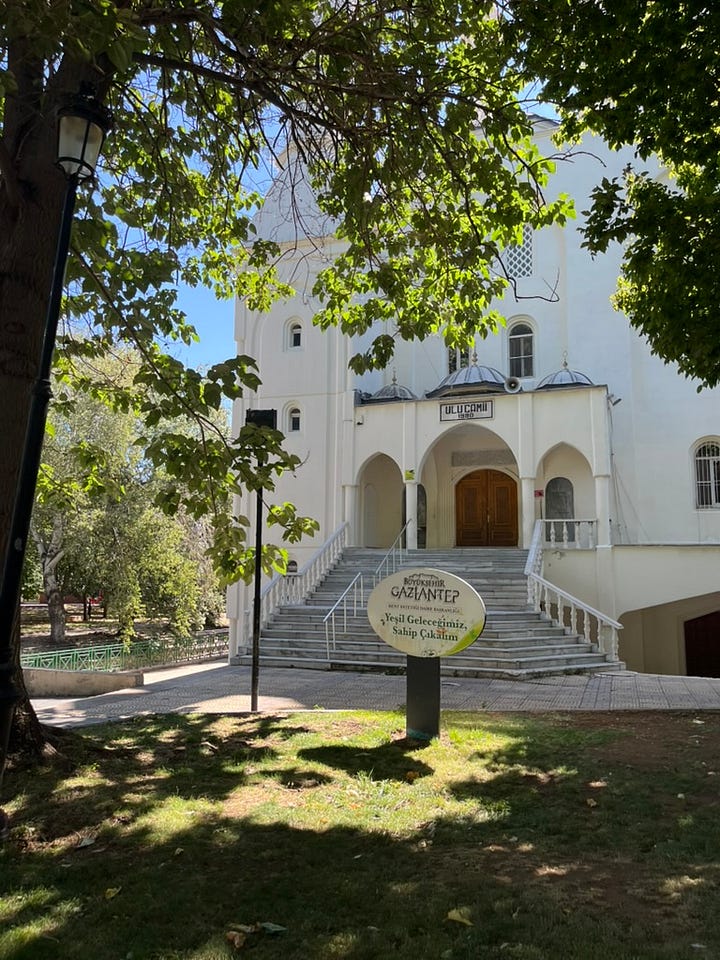
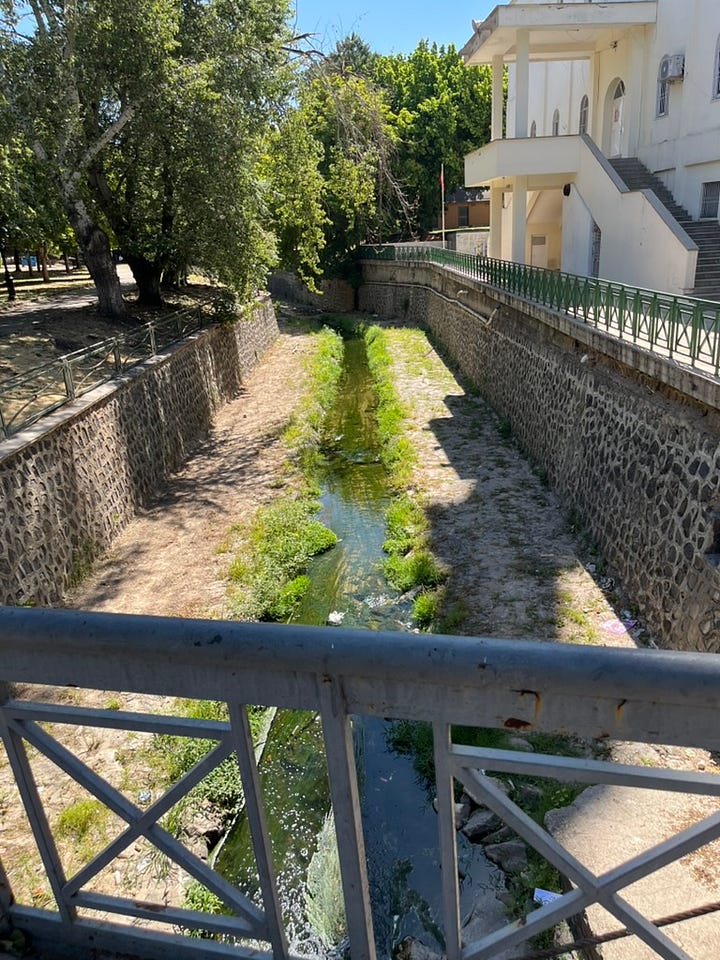
Then there’s a construction site that’s made quite a bit of progress in the weeks we’ve been here. I like the positioning of the flag here.
I’m now making my way back, and am almost out of the park, when someone stops me. It’s one of the workers on the construction site. He says they saw me taking a photo and asks me why.
I explain that I’m not from here, and that I’m taking photos to share on my social media. I tell him that I’m sorry that it made him uncomfortable, and that I’m happy to delete the photo in front of him.
He says that’s not necessary. He says that there was a robbery at the construction site last night, that it resulted in a confrontation, and that someone got stabbed (I don’t remember which side) and that they’re in critical condition. They’re waiting for officials to come and check out the site, and he was wondering if I had anything to do with it.
I tell him that I’m sorry about the stabbing, but that I have nothing to do with any of that. I repeat my offer to delete the photo. He says it’s fine, wishes me a good day, and takes off.
A few thoughts on parenthood and cities in Turkey
Soon after arriving in Gaziantep, one of the people who works with my wife recommended that I read a 2013 article that appeared in Birikim with the delightful title “Where is this child’s mother? Gender, fatherhood, and gift relationships” [Bu çocuğun annesi nerede? Cinsiyet, babalık, ve armağan ilişkileri]. It was written by Sezai Ozan Zeybek, an academic in Istanbul whose wife was working, and who spent a stretch of time as the primary caregiver to his newborn daughter. He uses that experience to branch into different ideas about how society, economics, and governance are structured. I think it might serve as a good mirror for my own experiences these three weeks.
Istanbul as a city is not a welcoming place for little people on wheels, for example. Zeybek has to use a child carrier to get around, but even then, has a very hard time with public transportation, or finding changing rooms. I suspect that the problem in Istanbul has only gotten worse since the writing of that piece, but I didn’t find Gaziantep to be too bad on the surface level. There were plenty of men pushing strollers around, and the streets were fairly calm, the sidewalks relatively well made, and you could definitely get by. I also noted people in electric wheelchairs get around just fine. I didn’t see any baby changing rooms I could use though. In Turkey, they’re almost exclusively added on to women’s bathrooms.
Zeybek also finds that the little bits of house work that one ends up doing with a baby are highly valuable, but that it’s difficult to do them well if you — like most men — haven’t been doing them all your life. If you’re a manual laborer in this system (like a cleaner or babysitter) you’re unlikely to build up skills in other parts of the economy, so you face the danger of being stuck in a highly precarious, low-wage sector all your life.
Again, this partially applied to me. Like many middle class men of my generation, I’ve done quite a bit of house work throughout my adult life. I’m also very good at doing baby-specific tasks, like changing, burping, feeding solids, and the myriad other things one ends up doing throughout the day. But doing these things for three weeks with very little help from anyone made me appreciate how this kind of work could trap women for life. Because when we planned this week in Gaziantep, I first thought that I could still get quite a bit of writing and reading done. I figured I could use the mornings and afternoons, when my wife would be back to spend time with us, but was almost always way too tired to accomplish serious work in these hours. I knew that I was only doing this for very limited amounts of time, but still got anxious about all the time I was spending doing things that had no bearing on my career (except perhaps provide material for Substack posts.)
These threads lead to bigger questions about how we organize modern life, and Gaziantep is very much a city wrestling with them. I met women who were trying to use their hard-earned skills in their family kitchens in order to eke out a living. I met Turks and Syrians navigating the city’s architecture, trying to position themselves in its social hierarchies. We’re all trapped in these patterns, but we’re also trying to push and pull them into different directions.
All in all, I think we had a good time. There’s many serious questions in my mind about Turkey’s economic, demographic, and cultural future. My time in Gaziantep hasn’t really gotten me answers, but I think it’ll help me ask more specific questions.






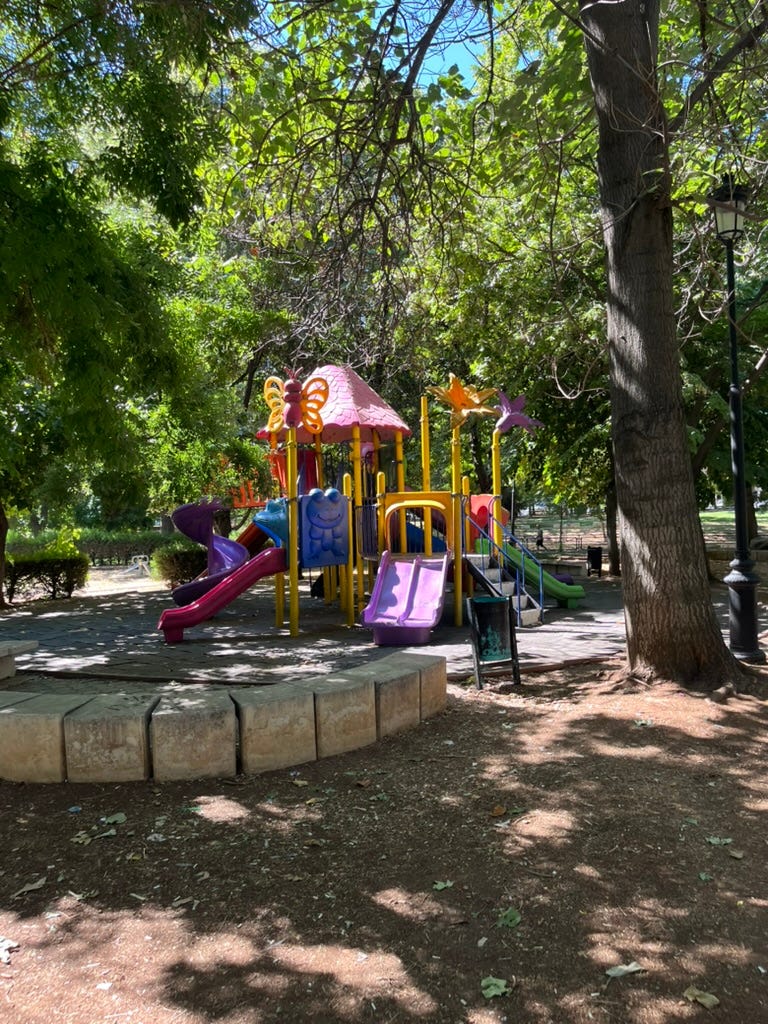

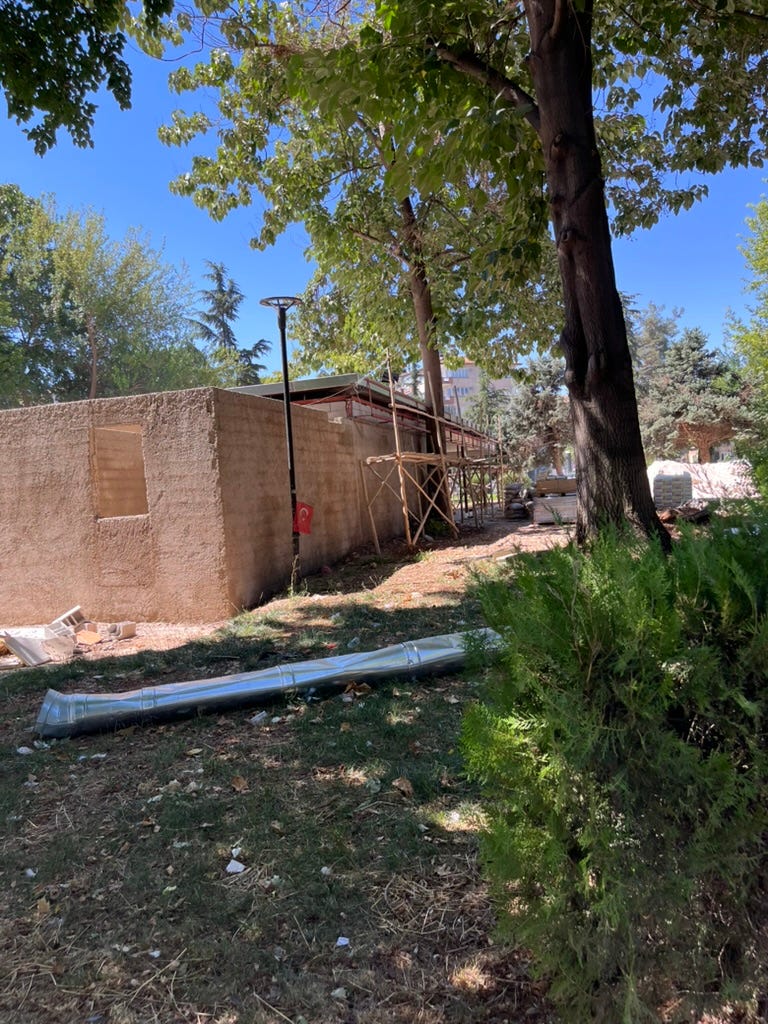
I used an airport changeroom with my baby in Istanbul recently and this woman looked at me like "What in God's name are you doing here??"